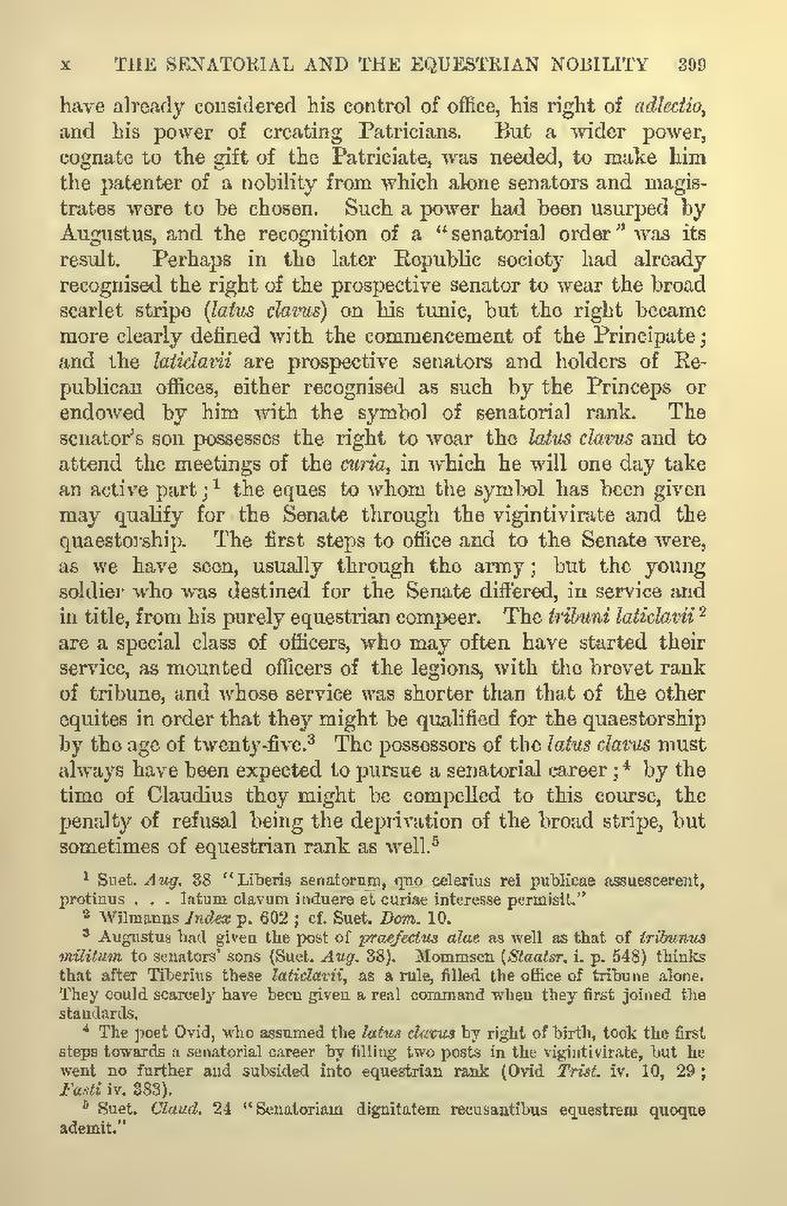have already considered his control of office, his right of adlectio, and his power of creating Patricians. But a wider power, cognate to the gift of the Patriciate, was needed, to make him the patenter of a nobility from which alone senators and magistrates were to be chosen. Such a power had been usurped by Augustus, and the recognition of a "senatorial order" was its result. Perhaps in the later Republic society had already recognised the right of the prospective senator to wear the broad scarlet stripe (latus clavus) on his tunic, but the right became more clearly defined with the commencement of the Principate; and the laticlavii are prospective senators and holders of Republican offices, either recognised as such by the Princeps or endowed by him with the symbol of senatorial rank. The senator's son possesses the right to wear the latus clavus and to attend the meetings of the curia, in which he will one day take an active part;[1] the eques to whom the symbol has been given may qualify for the Senate through the vigintivirate and the quaestorship. The first steps to office and to the Senate were, as we have seen, usually through the army; but the young soldier who was destined for the Senate differed, in service and in title, from his purely equestrian compeer. The tribuni laticlavii[2] are a special class of officers, who may often have started their service, as mounted officers of the legions, with the brevet rank of tribune, and whose service was shorter than that of the other equites in order that they might be qualified for the quaestorship by the age of twenty-five.[3] The possessors of the latus clavus must always have been expected to pursue a senatorial career;[4] by the time of Claudius they might be compelled to this course, the penalty of refusal being the deprivation of the broad stripe, but sometimes of equestrian rank as well.[5]
- ↑ Suet. Aug. 38 "Liberis senatorum, quo celerius rei publicae assuescerent, protinus . . . latum clavum induere et curiae interesse permisit."
- ↑ Wilmanns Index p. 602; cf. Suet. Dom. 10.
- ↑ Augustus had given the post of praefectus alae as well as that of tribunus militum to senators' sons (Suet. Aug. 38). Mommsen (Staatsr. i. p. 548) thinks that after Tiberius these laticlavii, as a rule, filled the office of tribune alone. They could scarcely have been given a real command when they first joined the standards.
- ↑ The poet Ovid, who assumed the latus clavus by right of birth, took the first steps towards a senatorial career by filling two posts in the vigintivirate, but he went no further and subsided into equestrian rank (Ovid Trist. iv. 10, 29; Fasti iv. 383).
- ↑ Suet. Claud. 24 "Senatoriam dignitatem recusantibus equestrem quoque ademit."
